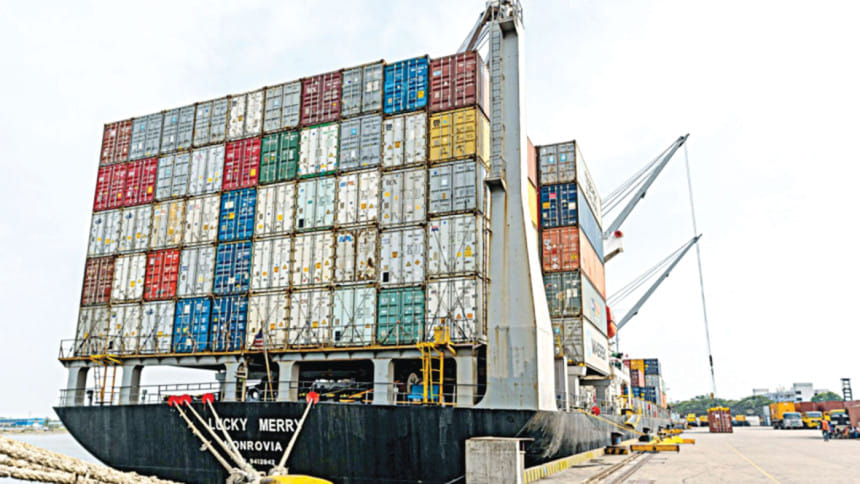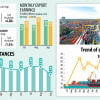Exports hit record on Christmas cheer

Exports fetched a record $5.37 billion in December as consumer spending centring on Christmas in the Western world returned in full swing after two pandemic holiday seasons marked by health fears and supply shortages.
Last month's receipts take 2022's export earnings to a record $54.7 billion, up 23.7 percent year-on-year, according to data from the Export Promotion Bureau.
Despite the record earnings, December's receipts, which were up 9.33 percent from a year earlier, fell short of the month's target.
As always, garments accounted for about 84 percent of the export receipts, bringing home $4.67 billion in December.
The export receipts from apparel shipments are high because of the increase in unit price on the back of the elevated price levels for raw materials like yarn and fabrics in the global market, said Faruque Hassan, president of the Bangladesh Garment Manufacturers and Exporters Association, the garment exporters' platform.
The same garment item that sold for $10 during the holiday season last year cost $13-14 this year.
Moreover, Bangladesh also started exporting high-end value-added garment items for which the international retailers and brands are also paying better prices, Hassan said.
However, export trends may not continue in the coming months as the cost of living crisis hits the US, the EU and the UK, he said, adding that the work orders may increase from March onwards.
"It has become clear that in the backdrop of growing geopolitical rivalry, Bangladesh's position in the garment supply chain would further consolidate -- this is what we saw in 2022," said MA Razzaque, research director of the Policy Research Institute.
However, the momentum seen in export earnings in the previous six months would not continue in the first six months of the year given the recession in Europe and the US, the major shipping destinations.
"This will certainly create a downward pressure on the demand for clothing," Razzaque added.
Between July and December last year, exports fetched $27.31 billion, up 10.58 percent year-on-year. Garment shipments raked in about $23 billion, up 15.56 percent.
As the second highest export earner, leather and leather goods shipment grew 13 percent to $637.29 million in the July-December period.
Shipment of non-leather footwear items also increased 17.84 percent year-on-year to $250.8 million in the first six months of fiscal 2022-23, while plastic goods export soared 40.97 percent to $100.17 million.
Not all sectors saw an uptick in shipments.
For instance, receipts from frozen and live fish and agricultural product shipments declined by 27.33 percent and 23.26 percent respectively.
Pharmaceuticals exports dropped by 22.44 percent, home textiles by 16.02 percent and jute and jute goods by 17.65 percent.
The export of jute and jute goods fell because consumers are choosing alternatives to jute goods as the price of the golden fibre increased significantly in the local and international markets, said Abul Hossain, president of the Bangladesh Jute Mills Association.
Shipment of carpet, specialised textiles, terry towels, furniture, engineering products and bicycle also fell in the July-December period.

 For all latest news, follow The Daily Star's Google News channel.
For all latest news, follow The Daily Star's Google News channel. 









Comments